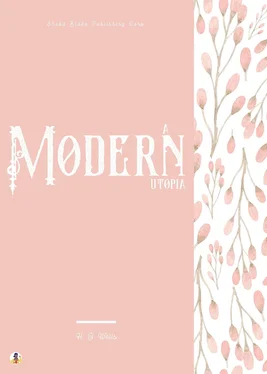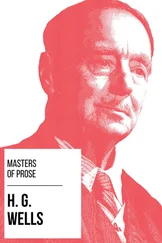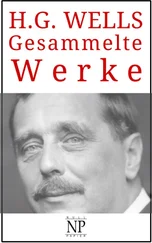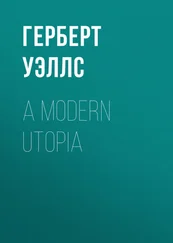H. G. Wells
A Modern Utopia
First published by Sheba Blake Publishing Corp. 2021
Copyright © 2021 by H. G. Wells
All rights reserved. No part of this publication may be reproduced, stored or transmitted in any form or by any means, electronic, mechanical, photocopying, recording, scanning, or otherwise without written permission from the publisher. It is illegal to copy this book, post it to a website, or distribute it by any other means without permission.
H. G. Wells asserts the moral right to be identified as the author of this work.
Sheba Blake Publishing Corp.
2288 Crossrail Dr
Atlanta, GA 30349
support@shebablake.com
First edition
Cover art by Sheba Blake
Editing by Sheba Blake
This book was professionally typeset on Reedsy
Find out more at reedsy.com

This book is in all probability the last of a series of writings, of which—disregarding certain earlier disconnected essays—my Anticipations was the beginning. Originally I intended Anticipations to be my sole digression from my art or trade (or what you will) of an imaginative writer. I wrote that book in order to clear up the muddle in my own mind about innumerable social and political questions, questions I could not keep out of my work, which it distressed me to touch upon in a stupid haphazard way, and which no one, so far as I knew, had handled in a manner to satisfy my needs. But Anticipations did not achieve its end. I have a slow constructive hesitating sort of mind, and when I emerged from that undertaking I found I had still most of my questions to state and solve. In Mankind in the Making, therefore, I tried to review the social organisation in a different way, to consider it as an educational process instead of dealing with it as a thing with a future history, and if I made this second book even less satisfactory from a literary standpoint than the former (and this is my opinion), I blundered, I think, more edifyingly—at least from the point of view of my own instruction. I ventured upon several themes with a greater frankness than I had used in Anticipations, and came out of that second effort guilty of much rash writing, but with a considerable development of formed opinion. In many matters I had shaped out at last a certain personal certitude, upon which I feel I shall go for the rest of my days. In this present book I have tried to settle accounts with a number of issues left over or opened up by its two predecessors, to correct them in some particulars, and to give the general picture of a Utopia that has grown up in my mind during the course of these speculations as a state of affairs at once possible and more desirable than the world in which I live. But this book has brought me back to imaginative writing again. In its two predecessors the treatment of social organisation had been purely objective; here my intention has been a little wider and deeper, in that I have tried to present not simply an ideal, but an ideal in reaction with two personalities. Moreover, since this may be the last book of the kind I shall ever publish, I have written into it as well as I can the heretical metaphysical scepticism upon which all my thinking rests, and I have inserted certain sections reflecting upon the established methods of sociological and economic science….
The last four words will not attract the butterfly reader, I know. I have done my best to make the whole of this book as lucid and entertaining as its matter permits, because I want it read by as many people as possible, but I do not promise anything but rage and confusion to him who proposes to glance through my pages just to see if I agree with him, or to begin in the middle, or to read without a constantly alert attention. If you are not already a little interested and open-minded with regard to social and political questions, and a little exercised in self-examination, you will find neither interest nor pleasure here. If your mind is “made up” upon such issues your time will be wasted on these pages. And even if you are a willing reader you may require a little patience for the peculiar method I have this time adopted.
That method assumes an air of haphazard, but it is not so careless as it seems. I believe it to be—even now that I am through with the book—the best way to a sort of lucid vagueness which has always been my intention in this matter. I tried over several beginnings of a Utopian book before I adopted this. I rejected from the outset the form of the argumentative essay, the form which appeals most readily to what is called the “serious” reader, the reader who is often no more than the solemnly impatient parasite of great questions. He likes everything in hard, heavy lines, black and white, yes and no, because he does not understand how much there is that cannot be presented at all in that way; wherever there is any effect of obliquity, of incommensurables, wherever there is any levity or humour or difficulty of multiplex presentation, he refuses attention. Mentally he seems to be built up upon an invincible assumption that the Spirit of Creation cannot count beyond two, he deals only in alternatives. Such readers I have resolved not to attempt to please here. Even if I presented all my tri-clinic crystals as systems of cubes——! Indeed I felt it would not be worth doing. But having rejected the “serious” essay as a form, I was still greatly exercised, I spent some vacillating months, over the scheme of this book. I tried first a recognised method of viewing questions from divergent points that has always attracted me and which I have never succeeded in using, the discussion novel, after the fashion of Peacock’s (and Mr. Mallock’s) development of the ancient dialogue; but this encumbered me with unnecessary characters and the inevitable complication of intrigue among them, and I abandoned it. After that I tried to cast the thing into a shape resembling a little the double personality of Boswell’s Johnson, a sort of interplay between monologue and commentator; but that too, although it got nearer to the quality I sought, finally failed. Then I hesitated over what one might call “hard narrative.” It will be evident to the experienced reader that by omitting certain speculative and metaphysical elements and by elaborating incident, this book might have been reduced to a straightforward story. But I did not want to omit as much on this occasion. I do not see why I should always pander to the vulgar appetite for stark stories. And in short, I made it this. I explain all this in order to make it clear to the reader that, however queer this book appears at the first examination, it is the outcome of trial and deliberation, it is intended to be as it is. I am aiming throughout at a sort of shot-silk texture between philosophical discussion on the one hand and imaginative narrative on the other.
H. G. WELLS.
One
The Owner of the Voice

There are works, and this is one of them, that are best begun with a portrait of the author. And here, indeed, because of a very natural misunderstanding this is the only course to take. Throughout these papers sounds a note, a distinctive and personal note, a note that tends at times towards stridency; and all that is not, as these words are, in Italics, is in one Voice. Now, this Voice, and this is the peculiarity of the matter, is not to be taken as the Voice of the ostensible author who fathers these pages.
Читать дальше














